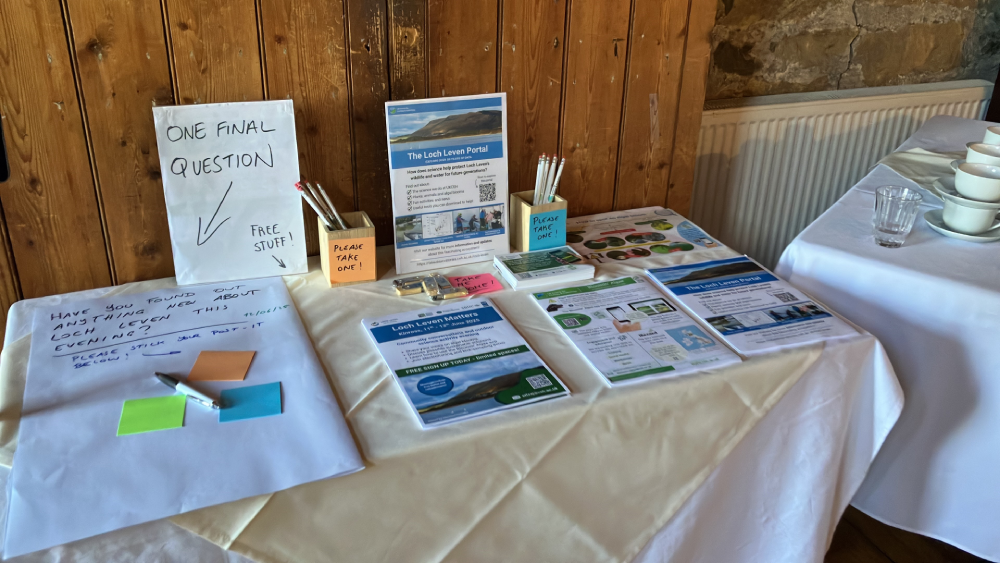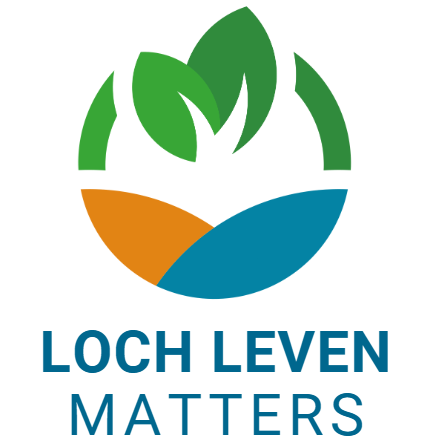
Loch Leven Matters
What is Loch Leven Matters?
Loch Leven Matters is a new initiative to build partnerships between researchers, and members of the public and other stakeholders to improve the future quality of Loch Leven. Loch Leven plays an important role in many people's lives around the catchment area. These include, but are not limited to, members of the public, local councillors, farmers, landowners, and recreational users such as walkers, cyclists, anglers, birdwatchers, dog walkers, artists and storytelling groups.
We invited anyone who interacts with, or is affected by, Loch Leven, to join us during our three-day public engagement event - which took place from Tuesday 11th June 2025 to Friday 13th June 2025. We invited people to join us in a conversation to gain an understanding of the causes and effects of water quality problems in the loch, explore possible solutions to those problems, and co-develop ideas for the research required to evaluate their effectiveness.
Funders
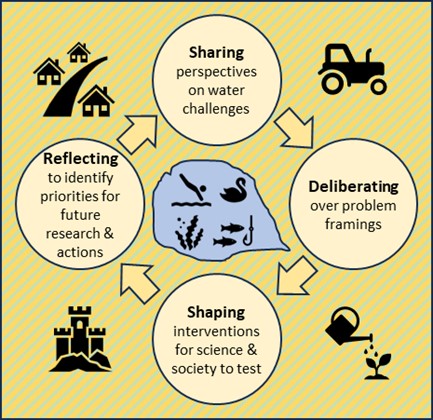
What's the issue?
Scotland's lochs deliver important ecosystem services to people and nature. These include flood protection, water supply, food security, recreation, and improved health and wellbeing. If high levels of nutrients our enter our lochs, this affects the natural balance of the system resulting in harmful algal blooms. These blooms, which are often seen as green or brown scums floating on the surface of the water, can kill aquatic life and produce harmful toxins that are detrimental to the health of people and animals.
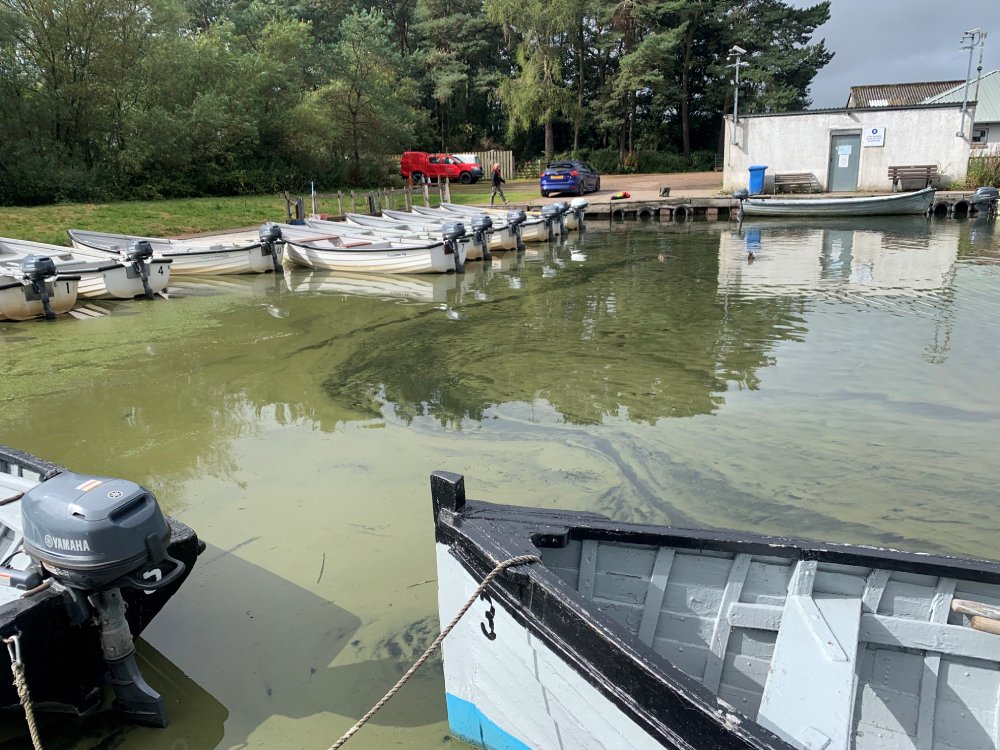
The link between algal blooms and nutrients was first recognised at Loch Leven in the mid 1980s. By the mid 1990s, restoration measures had reduced nutrient inputs to the loch by about 50 per cent and, by the mid 2000s, the loch had returned to good water quality. However, in recent years, the loch has experienced a resurgence in algal blooms; our monitoring suggests that this change is probably linked to climate change.
To help us understand why this has happened, and to explore how the effects of climate change can be mitigated, we would like to hear your views on research questions that need to be answered and management options that could improve the water quality of the loch.
Why do we need your help?
As scientists, we can propose theoretical solutions to water quality issues. However, we often lack insight into how Loch Leven's water quality affects the daily lives of local communities. We believe that fostering open communication between all who use and cherish Loch Leven is essential. By engaging with local residents, recreational users, and other stakeholders, we aim to gain a comprehensive understanding of how people interact with the loch and their visions for its future. With the recurrence of algal blooms, it's more important than ever to listen to diverse perspectives. Collaboratively, we can develop research strategies that not only improve water quality but also reflect the needs and values of the community.
The meeting in June brought together people who regularly use Loch Leven to help build a shared understanding of the causes and effects of water quality issues. Experience over recent years has shown that the most effective solutions come from taking a holistic approach — one that involves all relevant groups. That's why we want to collaborate directly with those who know the loch best to explore possible ways to address existing problems and agree on the research needed to test these solutions.
What's the plan?
We held two 'Community Conversation' evenings so that anyone who uses Loch Leven, or cares about the loch, could come along and tell us what they believe the issues around Loch Leven to be and help us to co-develop potential solutions to these issues. These were held on Tuesday 11th June at the Green Hotel, and Wednesday 12th June at the Grouse and Claret restaurant. The second evening was a repeat of the first evening, to allow more flexibility for attendees. Both events ran from 6:30 pm until 8:30 pm and just to entice people a bit more and; there was free food and drinks for all attendees!
We also held a Science Activities evening, in partnership with the Forth Rivers Trust, at Loch Leven's Larder on Friday 13th June 2025 from 6 pm – 8 pm. This was aimed at the younger generations (but adults were very welcome) and again, there was free food and drinks available (always a bonus). We showed attendees how to use our Bloomin' Algae app, demonstrated electrofishing where attendees saw some fish from the loch, and showed everyone how to use kick sampling techniques to catch the creepy crawlies.
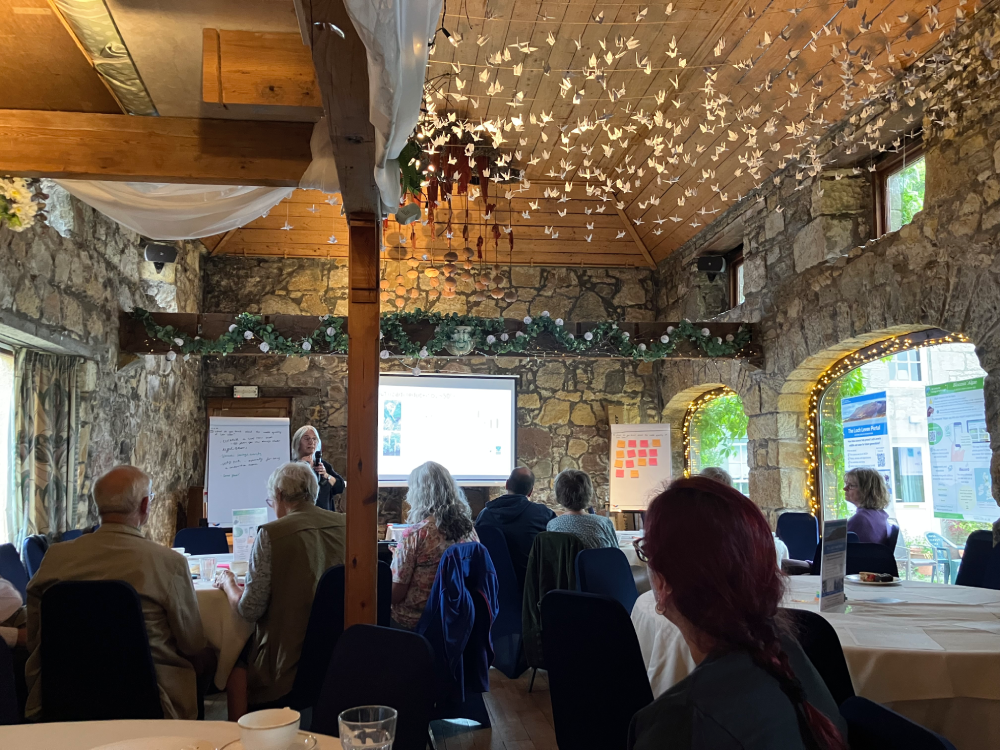
Community conversations
As part of the Loch Leven Matters initiative, we organised community conversations on 11–12 June, where people could share their thoughts on why Loch Leven mattered to them. In the first part of these meetings, people were asked to fill in an anonymous survey (using an electronic app called Mentimeter). We then continued with a talk by Dr Linda May on the long-term monitoring of Loch Leven, followed by a facilitated round-table discussion using flipcharts and sticky notes. Finally, we asked participants whether they had learnt anything new about Loch Leven on the day. Below, we summarise the main results of these conversations. As agreed with participants, data will be used to inform decisions on future research priorities and support water quality improvements at Loch Leven.
Read more on our blogpost: Loch Leven Matters: A Week of Community, Conversation, and Citizen Science | UK Centre for Ecology & Hydrology
Results of the Mentimeter survey
We had 22 responses. In terms of gender, 50% of respondents were women, 45% were men, and 1% preferred not to say. In terms of age groups, 43% were 61–70, 14% were 70+, 14% were 51–60, 14% were 41–50, 10% were 18–30 and 5% were 31–40.
We asked these respondents the following questions.
Why did you come along tonight?
The majority (70%) of respondents mentioned that they came along out of interest in the loch (e.g. interested locals, environment-enthusiasts, importance to the local community), 21% came to learn about impacts on the loch (e.g. algal blooms, concern about the loch's future) and 9% mentioned reasons relating to improving the loch (e.g. making a difference, participating in future solutions).
What is the state of Loch Leven's water quality in your opinion?
On a scale from 1 (very degraded) to 5 (very healthy), most respondents gave Loch Leven a score of 2 (40%) or 3 (40%). Only one respondent believed the loch to be very degraded (1) and only one respondent believed it to be very healthy (5).
What are the main factors affecting water quality at Loch Leven?
Most respondents (37%) indicated that pollutant discharges are the main factors affecting water quality, with 30% believing that runoff was a factor, too, and10% responded that they didn't know. Other responses included water balance, climate change and soil erosion.
What should we do as a community to support good water quality at Loch Leven?
Most people (32%) mentioned working together (e.g. supporting interested parties, working with farmers, coordinate action) as being very important in supporting good water quality at the loch. The next most popular responses were quantifying sources of pollution (18%), using nature based solutions to reduce pollution (14%) and improving sewage management (12%).
What community groups/activities/projects do you know of/are you involved in that are aiming to improve Loch Leven's water quality?
35% of people mentioned public engagement activities/projects (e.g. Loch Leven Discovery Day), and 35% of people mentioned other stakeholder engagement activities (such as those arranged by NatureScot, SNH, SEPA). The rest of the respondents (30%) said they didn't know.
Synthesis
In conclusion, most people attended because they had a personal interest in the loch and most respondents believed that pollution discharges are the main factors affecting the water quality. Respondents highlighted the need to work together to support good water quality at Loch Leven and most respondents were already involved in some public or stakeholder engagement activities related to this.
Results of the flipchart exercise
What do you like about Loch Leven?
The majority of respondents (48%) mentioned recreation (e.g. fishery, cycling, walking, birdwatching), 15% mentioned wildlife and 11% mentioned scenic quality (e.g. the loch being beautiful) as the things they liked most about Loch Leven. Others (9%) liked its nature (e.g. environmental diversity) and history (e.g. island and castle).
What do you dislike about Loch Leven?
The majority of respondents (16%) disliked the level of recreational use (e.g. tourism, overcrowding), 14% disliked the bad water quality (e.g. poor water clarity, phosphate pollution), and another 14% mentioned that they disliked the low quality recreational facilities (e.g. limited parking and accessibility, wooden walkway).
Why is Loch Leven important for you?
Most respondents (43%) mentioned environment or biodiversity (e.g. birds) as being important to them, while 14% of people mentioned a personal connection with the loch, recreation (e.g. swimming, dog walking) and better quality of life (e.g. feeling good spending time at the loch) as being important to them.
What do you think about the water quality at Loch Leven?
Most people (34%) mentioned that they thought that the water quality was poor (e.g. algal blooms, pollution from farm runoff and sewage), while 31% said it could be better and 15% said it was variable (e.g. seasonal). Only 15% said they thought water quality was good (e.g. clear this year, 2025).
What is your vision for Loch Leven by 2050?
Most respondents (20%) mentioned they wanted Loch Leven to be healthy by 2050 (e.g. with high water quality and clarity) and 18% mentioned they wanted the loch to be good for nature and biodiversity (e.g. more fish, balanced ecosystem). Others (9%) mentioned that the loch should be protected (e.g. less development, still a nature reserve), and another 9% mentioned the need for more engagement and understanding (e.g. more communication) and better water level management (e.g. better control of sluices, deeper water).
How do we achieve this vision?
Most respondents (18%) mentioned nature-based solutions (e.g. buffer strips, restoring wetlands, meandering rivers) as providing solutions to some of the loch's problems, while 16% mentioned education and community engagement as being important. Another 10% mentioned engineering solutions (e.g. sluice gates, drainage systems) as potentially helping to deliver their vision for 2050 with another 10% mentioning the need to reduce soil erosion.
What research should be done?
Half of the respondents (50%) mentioned that research was needed into controlling algal blooms (e.g. phosphorus removal or recycling, assessing when algal blooms are dangerous) and 16% of respondents mentioned the need for research to support sustainable management (e.g. studying the ecology of the loch, finding out how birds and fish are affected by pollution). Other responses (8%) mentioned research into species invasions, tipping points, and climate change mitigation as being important, as was learning from others.
Have you found out anything new about Loch Leven today?
Half of the participants (50%) mentioned they had learnt about the causes and effects of pollution at Loch Leven (e.g. agricultural runoff, the role of phosphorus pollution in creating algal blooms, how pollution affects fish). 17% mentioned they had learnt about the ongoing research at the loch and 17% mentioned the length and frequency of monitoring data.
Conclusion
In summary, most people like Loch Leven for its recreational use and value its environment and biodiversity. However, they also dislike the overcrowding caused by tourism and the bad water quality. Most people mentioned that the water quality was poor or could be better. By 2050, respondents would like the loch to be healthy and good for nature and, to achieve that vision, they felt that more research into how to control algal blooms would be needed. After these community conversations, most people mentioned learning about the causes and effects of pollution at Loch Leven.
